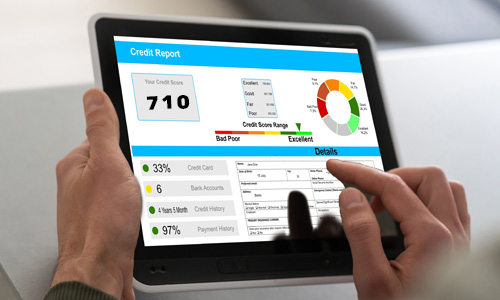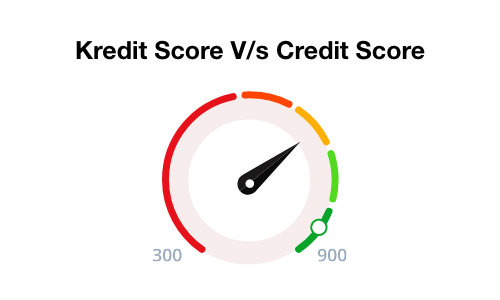- What Exactly Is a Credit Score?
- Credit Score in UAE
- What is the Average Credit Score in the UAE for Loan and Credit Card Acceptance?
- Average Credit Score for Auto Loan: Requirements
- What is the Average Credit Score for Mortgage Approval?
- What are the Factors Affecting a Credit Score in the UAE?
- How to Enhance your Credit Score?
- Who Evaluates Your Average Credit Score?
- How to Receive Your Credit Score and Credit Report?
What Is the Average Credit Score in UAE
Credit score in UAE, as one may be aware, is a key factor considered by a financial institution whenever you apply for any product like a credit card, loan, insurance plan, etc. Several banks and providers also require the applicant’s credit score to be above a certain limit to grant approval.
Continue reading through this comprehensive article to find out more details about the average credit score required in the UAE to get approved for loans and new credit cards. You will also find facts related to the factors affecting the credit score, how to avoid a bad credit score, and so on. To begin with, let’s consider the fundamental question first:
What Exactly Is a Credit Score?
A credit score in the UAE plays a key role in the determination of your potential to take a loan or mortgage from a bank, affecting whether you are eligible to obtain a new credit card, an insurance plan, a loan, and so forth.
Overall, the credit score can be considered one of the most vital aspects verified by financial institutions before approving or rejecting a loan or credit card application (as well as the extent of the financial assistance, if approved).
The subsequent question, in this case, is, then, how is a credit score assessed? The answer lies in the term AECB, which refers to the al etihad credit bureau. This organisation collects information regarding your financial history with respect to your credit and loan repayment records (if any) and other payments from banks and other providers in the UAE. The credit score is then calculated based on this information.
Credit Score in UAE
In the UAE, a credit score ranges from 300 to 900. The higher your credit score, the lower the lender’s risk. After assessing your creditworthiness, financial institutions decide on whether you are trustworthy enough with respect to the financial product that you seek to obtain. On the other hand, you can experience complications with a poor credit score.
If your credit score is poor, banks may question your potential to repay loans or the dues of a credit card on time. It should be noted that in the UAE, an individual has the option to seek information regarding their credit score or even a credit report from the Al Etihad Credit Bureau (AECB). This feature helps maintain transparency, as one can even ask for rectification and the generation of a new credit score and report in case they find some errors in the report.

What is the Average Credit Score in the UAE for Loan and Credit Card Acceptance?
While each type of loan (and the provider) may require a different credit score, financial institutions across the UAE generally consider 650-710 as the average credit score. Whether you need an automobile loan or a home loan or even a credit card, the credit score is always among the top criteria to estimate the same. Thus, one can aim to keep a credit score above the mentioned range to enhance their chances of getting their preferred product.
It’s worth noting again that the average credit score required for financial products in the UAE usually differs for each category. For instance, the specific average credit score for mortgage approval may not be the same as the average credit score for auto loans, even when considering the two plans from the same provider.
Average Credit Score for Auto Loan: Requirements
As you must be well aware now, it is important to maintain a good credit score or at least an average credit score to be considered eligible for various financial products, with car loans in the UAE being no different. Generally, financial institutions accept a score in the 651–710 range for providing automobile loans. As there is a high possibility that your loan will be rejected if your credit score is below this range, you should try to keep up with a better credit score than the average one to avoid any hindrances while applying for a loan.
What is the Average Credit Score for Mortgage Approval?
To get approval for a mortgage loan in UAE, you can try to maintain a credit score of 710 or more. In rare scenarios, banks can provide you with a home loan if your credit score ranges near 570 or more. However, it is highly recommended not to rely on this score as it can create a dilemma of approval or disapproval. For this reason, it is always better to have a credit score of more than 720.
Having a good credit score signifies that you are sufficiently capable to manage your finances efficiently and can pay off your mortgage loan on time. And while there are other factors that affect the approval or rejection of your loan application, an average credit score for mortgage approval is among the most crucial ones.

What are the Factors Affecting a Credit Score in the UAE?
Bill Payments: Paying utility bills on time ensures a good credit score, as you indicate that you are punctual regarding the payment of all utility bills (and can be trusted to maintain the same standards with larger loans or credit).
Loan Repayments: If you are in debt, you should first make sure to complete your monthly instalments at regular intervals. With each delayed or missed loan instalment, your credit score can witness a considerable drop. Consequently, the bank may get concerned regarding the finances of such individuals with low credit scores.
Number of Credit Cards Owned: Having multiple credit cards can add up to your poor credit card score if you fail to manage them properly. At the same time, it must be remembered that the correct usage of these plastic cards, if you have more than one, can ensure an average credit score. The problem arises only when you own several credit cards but make delays in repaying the dues on time. However, unlike a single credit card, the negative impact on your credit score could be more here.
History of All Your Payments: Financial institutions check all your previous payment history to release your credit score. Thus, if any issues are noticed for payments even beyond the domain of loans or credit cards, your credit score can go down and become less than the average credit score required for eligible applications.
Applications for Loans and Credit Cards: One of the other primary factors that can make difference in your credit score is applying for credit cards and loans continuously. Even if you have an emergency requirement, you should avoid applying for a loan or a credit card multiple times in a short period as multiple rejected applications can lead to a diminished credit score.
Thus, in case your request for a financial product is declined for the first time, you must figure out the reason for the rejection and make improvements before applying again.
Constant Credit Score Check: Individuals who evaluate their credit scores repeatedly (in excess) can notice a change in their credit score. This is due to the fact that checking your credit score beyond a certain number of times in a period can actually lead to a decrease in it.
How to Enhance your Credit Score?
If you maintain a good credit score, it becomes easier for financial institutions to lend you the required funds or services. To ensure a good credit score, you can first make sure to pay all your bills and debts, if any, before the due date and keep your bill payment history clean. Avoiding delays in paying off your monthly instalments for credit card dues or debts can be favourable for your credit score.
Even if there is an urgent requirement for a loan or a credit card, it is advisable to avoid applying for them multiple times in a short span. Moreover, if you have a credit card, you should utilise it smartly. Thus, instead of lowering the number of payments on a card, you should remember to pay off the bills at the end of each billing cycle.
Lastly, one of the easiest things you can keep in mind to improve your credit score in UAE is to avoid verifying your credit score frequently, as you can expect your credit score to come to the level of an average credit score if you don’t check the score excessively.
Who Evaluates Your Average Credit Score?
The Al Etihad Credit Bureau (AECB) is responsible for producing credit scores and credit reports for both individuals and companies in the UAE. However, the organisation charges a specific amount to generate a credit score and credit report.
Companies need to pay AED 157.50 (inclusive of tax) to receive their credit report, whereas the charge is AED 84 (including tax) for individuals. It must be noted that in case of data correction, one can request a credit score again.
How to Receive Your Credit Score and Credit Report?
To view your credit score, you can simply install the AECB CreditReport app (available for both Apple and Android users) and follow the steps discussed below -
- Register with your basic details related to Emirates ID, nationality, and more to sign into the application.
- After that, select any one option of the following: ‘Score Only’ or ‘Report with Score’.
- Make the payment for the option of your choice to get the desired document.
Note: If you apply for a plan related to insurance, loan, credit card, and more with Policybazaar UAE, you will get the option to verify your credit score for free!
Key Takeaways
It is essential to acknowledge that although the average credit score lies somewhere between 650-710, the average credit score for auto loans, average credit score for mortgage loans and others can significantly vary. Consequently, it is recommended to verify the minimum required credit score for each product before applying for it.
You can always check your AECB credit score in case of any data issues. However, you can also continue on our website to get your credit score for free. Ultimately, checking your credit score regularly (under a reasonable limit) can help you monitor the impact of your financial decisions on your score, which, in turn, can help you maintain a good credit score in UAE.
Find some quick facts related to credit score in UAE discussed below:
Once you complete the payment for requesting your credit report and credit score, the concerned authority will usually send the documents within 8 hours to your registered email ID.
An applicant with a low credit score can face rejection from the bank for their credit card or loan application.
A credit score ranging between 650 and 710 is generally accepted by financial institutions in the UAE as an average credit score.
Yes, submitting numerous loan applications can negatively impact your credit score. Thus, you must first analyse the reason behind your low credit score before applying for the same again.
A credit report released by the AECB comprises all your credit history including previous bill payments, repayments of loans, and the entire payment history for the past 5 years.
It should be noted that it is not mandatory to request a credit report, as you can simply request access to the credit score as well. Nevertheless, if you wish to evaluate your credit score in detail, you can apply for a credit report.

More From Credit Score
- Recent Articles
- Popular Articles











